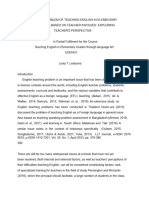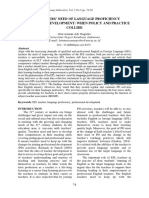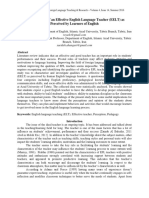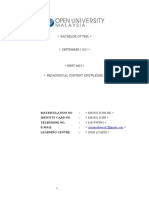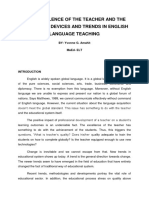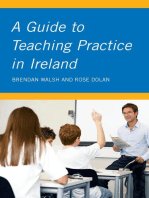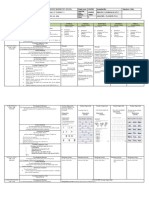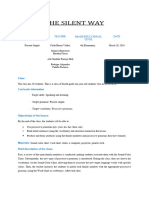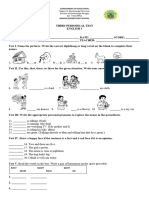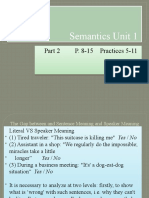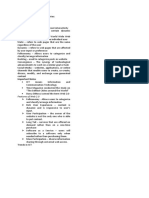hh
Uploaded by
sarmientokristine1330hh
Uploaded by
sarmientokristine1330Available on http://e-journal.unisda.ac.
id Universitas Islam Darul ‘Ulum Lamongan
e-ISSN: 2579-8960 P-ISSN: 2460-2167 Volume 8, No 1, June 2023
EFL TEACHERS’ VOICE ABOUT THE PEDAGOGICAL COMPETENCIES IN
TEACHING ENGLISH GRAMMAR CONTEXT
Hustiana1, Asdar2, Ahyadi3
1
[email protected], [email protected], [email protected]
1,2,3
Universitas Sulawesi Barat
Received: 16th May 2023 Revised: 7th June 2023 Accepted: 15th June 2023
ABSTRACT This research was focused on understanding pedagogical competence voiced by EFL teachers in
teaching grammar context. The research was conducted in Makassar. This study was descriptive qualitative
research that involved six teachers in Makassar as participants which chose randomly. The instrument of this
research was an interview which was analyzed with a qualitative method. The result of the current study showed
that four indicators including pedagogical competence owned by the teachers namely the competence in
understanding the students’ need in learning grammar, competence in preparing teaching grammar, competence
in choosing method and technique in teaching grammar, and competence in choosing assignment and evaluating
the students’ outcome after learning grammar. This research would have a great theoretical and practical
contribution to undergraduate students and future researchers in the English language department, especially
students from the education department or candidates of teachers in terms of understanding pedagogical
competence.
Keywords: EFL teachers, pedagogical competence, grammar
INTRODUCTION
The quality of education is assigned by the quality of teachers. Everyone believes that
teachers have a big contribution and are very influential in the teaching-learning process.
Teachers play a very prominent role in assisting the development of students to realize their
life goals optimally. This belief arises because not all parents have the ability in terms of
experience, knowledge, and the availability of time to teach their children at home. In such
conditions, parents hand over their children to teachers at school with the hope that their
children can develop their abilities optimally.
Referring to this, teachers must have competence in their field in carrying out their
roles. As described by Wichadee in Siregar et al., (2020) that one of the absolute factors
contributing to the development of the students’ learning is the teacher factor. Teachers should
be able to influence their students to a better understanding. The teacher must master the
material in the class because a professional teacher is a teacher who has a broad mind, masters
the subject being taught, has good learning skills and can mingle well with parents of students
and the surrounding community (Ahmad, & Siregar, 2015). In addition, English teachers have
to pursue professional development because it is considered an essential factor for teachers to
function successfully in their field (Elnadeef & Abdala, 2022).
One of the competencies that must be possessed by a teacher is pedagogical
competency. Pedagogic competence is the ability of a teacher to be able to manage learning
(Jannah, 2020). Teachers’ ideas about teaching and learning significantly influence their
implementation of innovative teaching approaches and science education reforms Van Driel et
al. in Stammes et al., 2020). Maximum pedagogical competence can be examined from the
teaching and learning process conducted by the teachers. The teacher as a component in the
teaching and learning process has competencies that greatly determine the success of learning
because the main function of the teacher is to design, manage, implement, and evaluate learning
(Getteng, 2011). As pedagogical competence becomes the ability of teachers to implement
instructional activities that directly interact with students with measurable learning outcomes,
English teachers have the compulsory task to develop themselves in this area (Aulia, 2021).
However, even though teachers have understood these competencies, there are still
some teachers who do not understand the essence of pedagogical competence. They consider
Edulitics Journal 27 | Page
Available on http://e-journal.unisda.ac.id Universitas Islam Darul ‘Ulum Lamongan
e-ISSN: 2579-8960 P-ISSN: 2460-2167 Volume 8, No 1, June 2023
that this competency is only a decoration or a complement to other competencies. Even though
this competence is the main basis before carrying out the learning process so that learning
objectives can be achieved, especially in teaching English Grammar.
Teaching Grammar is not easy. The teacher must prepare well before beginning the
class. Basically, three areas of grammar teaching need to be considered: grammar as rules,
grammar as form, and grammar as a resource (Murtisari et al., 2020). The students need to
experience how grammar is related to what we want to say and how we expect others to
interpret our language use and its purpose because grammatical competence is one of the
communication skills (Olcu, 2022).
However, based on some observations in the education field, many teachers directly
come into the class without any preparation. They gave some assignments to the students
without explaining the material. They also give scores for the students without assessment
indicators. Whereas, Gurney in Faidal et al., (2020) claimed that some factors could provide a
foundation for good teaching. Firstly, the teacher should possess in-depth knowledge,
enthusiasm, and responsibility for learning. Secondly, classroom activities should encourage
learning. Thirdly, assessment activities encourage learning through experience. Fourthly,
useful feedback establishes the learning processes in the classroom. Fifthly, effective
interaction between the teachers and the students creates an environment that respects,
encourages, and stimulates learning through experience. Thus, it can be concluded that some
teachers ignore the competency they have to instill in themselves. It gives an impact on the
students who are confused when they make grammatically correct sentences because the
sentence structure is different from their language.
Therefore, the current research purposes were to describe the teachers’ EFL voices
about the Pedagogical Competencies in English Grammar Teaching. It is expected that this
research will contribute to the EFL teaching area. Theoretically, this research will describe the
specific ways EFL teachers have been done to improve their pedagogical competencies.
Meanwhile, practically, this research guides the EFL teachers to implement all pedagogical
competencies items for their future career of teacher professionalism as stated in official
government regulation.
LITERATURE REVIEW
EFL Teachers
A Teacher is a person who conducted the teaching process and has a role of an educator,
a guide, a coach, and an evaluator in the learning process. Officially, a teacher has obtained a
teaching qualification in an institution or school. According to Richards and Rodgers in Alaye
(2019), the teacher acts as the model of language, the lesson planner, the controller of learner
practice and the evaluator of learner's performance, the organizers in the teaching, the planners
of the course, preparing the materials and deciding what and how learners ought to learn. Thus,
an EFL Teacher is a person who has the qualification and certificate to teach English in public
education and who has a role as planner, controller, and evaluator in English class. EFL
teachers are typically non-native speakers who have never spent time in an English-speaking
country and therefore may find it much harder to make decisions of a native like-nature.
Successful EFL teachers have respect for their students, taking time and effort to prepare
classes and mark assignments.
Unlike in its neighboring countries—such as Singapore, Hong Kong, and Malaysia,
where English is widely spoken as a second language—English in Indonesia is more likely to
be taught and learned only as a foreign language. This means that learning and teaching English
occurs mostly in classrooms, rather than during daily communication (Sulistiyo, 2016). Being
an EFL teacher is not easy as we think because According to Sulistiyo in Sulistiyo (2016), there
are several factors creating difficulties in teaching EFL in Indonesia. First, EFL teachers must
Edulitics Journal 28 | Page
Available on http://e-journal.unisda.ac.id Universitas Islam Darul ‘Ulum Lamongan
e-ISSN: 2579-8960 P-ISSN: 2460-2167 Volume 8, No 1, June 2023
teach students in large classes, often with more than 50 students. Second, not all students who
attend English classes are motivated. Thus, it can be concluded that an EFL teacher must have
specific knowledge and skills to be able to transfer the information needed by students during
their development.
Pedagogical Competency in Teaching English
Teachers’ competencies have been broadening concerning for to reform studies in
education, development of teacher education, scientific results of educational science, and
other fields (Ada & Azizah, 2016). Many experts argue the definition of competence.
According to Chouhan & Srivastava (2014), competence is a crucial characteristic of how a
person behaves or thinks in different situations and adapts to change over time. While Tucker
and Cofsky in Sulaiman & Noor (2020) there are five main components of competence: (i)
knowledge - referring to one's information and knowledge, (ii) skills - referring to one's ability
to perform a particular task, (iii) self-concept and values - refers to a person's attitude, values,
and image, (iv) characters - the ability to perform tasks in his/ her field and (v) the motives -
emotions, desires, physiological needs or impulses to action. In addition, Mulyasa (2009)
argues that competence is a combination of knowledge, skills, values, and attitudes which are
reflected in the habit of thinking and acting. Based on the definition above, it can be concluded
that competence is the ability to choose the appropriate behavior and to decide the best choice
by using skill, psychological needs, and values.
One of the competencies that teachers must apply in their daily life as an educator is
pedagogical competence. Pedagogical competence is not only seen as the knowledge of using
techniques that are used technically but also the acquisition of routines which every teacher
undoubtedly needs to save time and energy for more significant aspects of the work (Siregar et
al., 2020). Pedagogical competence refers to the ability to manage the process of teaching and
learning activities that includes the understanding of learners, designing and implementing the
instructional activities, evaluation of learning outcomes, and developing students to actualize
their potential (Aulia, 2021). In line with this, pedagogical competence can be interpreted into
how the teacher understands the students’ cognitive and personal to make it easy in designing
the instructional process dealing with determining the instructional strategy based on students’
characteristics, the material, and the objective of the instructional process and arranging the
lesson plan. While, according to Elnadeef & Abdala (2022) Pedagogical content knowledge
involves mastering approaches, methods, techniques, and procedures for teaching the English
language. It is the disciplinary-specific pedagogic knowledge required for teaching particular
subjects and making concepts accessible to learners. The elements of pedagogic competence
are understanding the education system and knowledge, developing and analyzing learning
abilities, understanding interaction in the world of education, having new ideas in the education
system, using ICT, and understanding concepts and theories learned while studying (Claire
Rees et.al in (Somantri, 2021). According to Mulyasa in Hakim (2015) that, pedagogical
competence is the ability to manage the learning of learners including an understanding of
learners, instructional design and implementation, evaluation of learning outcomes, and the
development of learners to actualize their potential.
Teaching Grammar
In English language teaching, teachers’ knowledge, as an important part of teacher
cognition, has been a burgeoning area of research in the last four decades as one of the
indicators of successful teaching (Shulman in Suharyadi et al., 2021). Teaching English is
aimed at developing multilingual languages that can enrich all our languages; this has been an
ongoing national vision (Mishra in Sharma & Sudarshan, 2021). According to Sequeira (2012),
teaching is a set of events, outside the learners which are designed to support the internal
process of learning. While John Brubacher in Rajagopalan (2019) argued that Teaching is the
arrangement and manipulation of a situation in which there are gaps or obstructions which an
Edulitics Journal 29 | Page
Available on http://e-journal.unisda.ac.id Universitas Islam Darul ‘Ulum Lamongan
e-ISSN: 2579-8960 P-ISSN: 2460-2167 Volume 8, No 1, June 2023
individual will seek to overcome and from which he will learn in the course of doing so. Thus
it can be concluded that teaching is an activity that is designed to overcome what the students
need.
One of the teaching activities in teaching English is teaching grammar. Grammar is
marked with formulas and rules. Larsen-Freeman (2014) highlights that grammar has three
dimensions, structure or form, semantics or meaning, and use or pragmatics. While, according
to Thornbury in Tiarina et al., (2019), grammatical instruction should be given for several
reasons. First, grammar teaching provides guidance to language learners to produce unlimited
numbers of sentences. Second, the teaching of grammar offers direct correction to sentences
containing ambiguity of meaning. Third, grammar teaching helps learners avoid the
fossilization of mistakes. Foreign language grammar is always seen as the process rather than
the product since grammar is a source for creating meaning in a context‐sensitive manner.
Three interdependent aspects of grammatical features: (1) Formality, which concerns how a
specific structure is constructed and how it fits in with other structures in a sentence (for
example, morphology, syntax, and phonetic patterns), (2) Meaning, is related to semantic, such
as lexical and grammatical meaning, as well as derived compound words, and (3) Usage, is
related to the pragmatics or the meaning of grammatical structures in a particular context,
whether it reflects social, linguistic, or situational issues (Richards, 2017). The teaching of
foreign grammar must be considered the meaning and the message conveying the message of
the language. Therefore, there is no list of grammatical structures that need to be taught and
paid attention to meet the student's needs, as an error affects the achievement of communication
goals and the student's feedback.(Tarigan & Stevani, 2022). An increasing number of studies
suggests that teachers‟ grammar teaching is influenced by their prior knowledge, experience,
beliefs, and contexts, implying that classroom practices are not affected by handouts and
prescribed guidelines (Milad et al in Tarigan & Stevani, (2022)
RESEARCH METHOD
This study is descriptive qualitative research that involved six teachers in Makassar as
participants which chose randomly. They were selected based on the set-up criteria as follows:
they should graduate from an English department; they should at least have had an
undergraduate diploma as a minimum requirement of the teachers’ qualifications; they taught
English in weather in senior high schools, in private senior high schools and/or vocational
schools; they should be tenured and certified English teachers; and they should have an
experience of joining workshops, conferences, seminars, or training on English language
teaching. The instrument of this research was an interview which was analyzed with a
qualitative method.
FINDING AND DISCUSSION
This research aimed to describe the teachers’ EFL voices about the Pedagogical
Competencies in teaching English Grammar. Based on the result of interviews with some
teachers it could be summarised that there were some indicators as a representation of
pedagogical competence owned by a teacher when they taught grammar namely the
competence in understanding the students’ need in learning grammar, competence in preparing
teaching grammar, competence in choosing method and technique in teaching grammar, and
competence in choosing assignment and evaluating the students’ outcome after learning
grammar. The result of their voices was elaborated below:
Pedagogical Competence in Understanding the Students’ Need in Learning Grammar
Grammar is one of the most difficult subjects for the student. Thus, the teacher as an
educator must understand what the students need to fulfill the learning objectives. The students’
Edulitics Journal 30 | Page
Available on http://e-journal.unisda.ac.id Universitas Islam Darul ‘Ulum Lamongan
e-ISSN: 2579-8960 P-ISSN: 2460-2167 Volume 8, No 1, June 2023
need is a base for the teacher before making a lesson plan and choosing a method or technique.
In this research, some teachers considered the same needs of the students. The transcripts of
the interviews between the researcher and teachers about the students’ needs were as follows.
Table 1. The result of Interview about understanding the students’ need in learning grammar
Teacher Transcript
Code
1 “Based on my experience, Hmmm, I think They hmmm the students I mean, they need just 10 or
even 5 % explanation and the rest portion of practice. In my opinion, they hmmmm need to see the
real use of the grammar rules. They have to internalize the grammar rules into their daily and
academic practice. It means that the teacher must explain the rules. Because they need the rules.
They cannot make a good sentence if the don’t understand the rule. So, the main point of grammar
actually is the rules”.
2 Actually for the students, they need understanding. I mean they have understand the point of the
grammar itself. But, it doesn’t mean that we have to explain the rules for a whole time in the class
but I think students in grammar class need mor practices, eeemm they need some exercises or quiz.
By finishing those like excercise or quiz, they will understand the point of grammar itself, or the
will easy to remember the rules of each item of the grammar. Hmmm, besides as teacher I think in
understanding the grammar students to listen a song, maybe or watch a movie. So, they can analyze
each sentence of what they listened and from what they watch.
3 From me, the basic need for students in learning grammar is Vocabulary and part of speech. Those
are the basic. Hmm, if they memorize some rules but they don’t have vocabulary, they cannot make
any sentences. Just the same with part of speech, if they cannot differentiate between verb and noun,
or between adjective and noun, they cannot put them in the rules. So, they cannot make an
appropriate sentence. I think, something like that.
4 I think students need to enrich their vocabularies master the verb in order to make a sentence or
paragraph.
5 As a teacher, I think we just need to explain the Definition and give more examples for the students,
in order they more understand.
6 In my students' case they need to improve their vocabularies first before coming to the learning
grammar because I usually use text or listening activity in guiding the students in learning grammar
Based on the teachers’ answers above, the researcher inferred that all teachers must
understand the students’ needs. Each teacher has a point of view about the students’ needs in
learning grammar. Teacher 1, Teacher 2, and Teacher 5 argued that the students need more
explanation and the rest portion of practice grammar. Teacher 3, Teacher 4, and Teacher 6
argued that the students need to enrich their vocabulary and understanding of parts of speech.
According to Azam (2009), While grammar fixes up or determines as well as shortens the range
of a language, vocabulary opens a limitless horizon for the language. It gives the language the
better option to choose forms. Thus, it could be corrected that even though the students
memorized all of the rules of grammar, they did not enrich their vocabulary, they could not use
the grammar itself whether in spoken or written form. Furthermore, it could be said that
understanding the students’ needs whether giving more explanation or helping them to enrich
their vocabulary was one of pedagogical competence that must be owned by the teacher. The
teacher could maximize the learning process because they would put some activities in the
classroom that related to the student’s needs.
Pedagogical Competence in the Preparation of Teaching Grammar
Teaching grammar needed preparation. After interviewing the teachers, the researcher
found some facts related to the teachers’ preparation before conducting teaching grammar in
the classroom. The researcher found that each teacher has different preparation. The transcripts
of the interviews between the researchers and teachers are as follows.
Edulitics Journal 31 | Page
Available on http://e-journal.unisda.ac.id Universitas Islam Darul ‘Ulum Lamongan
e-ISSN: 2579-8960 P-ISSN: 2460-2167 Volume 8, No 1, June 2023
Table 2. The result of Interview about preparation of teaching grammar
Teacher Transcript
Code
1 Before I conduct teaching grammar, of course I have to decide the objectives that I want to reach
by the end of the lesson. Hmmm, besides, I also prepare Fun activities to reach that objective. As
we know that, some students will be bore in the class of the learning process is not varies.
2 So, in teaching sometimes I don’t teach grammar spesifically in my school. Grammar in my class
is integrated with the material that I give for the students. Because, I conducted genre based
approach. So, sometimes I prepare passage or video that be a media for me in teaching grammar.
3 Hmmm, I always prepare a lesson plan
6 I start teaching grammar by giving the students reading or listening activities. It means that I need
to prepare some passages or audio or video for my teaching activities.
Based on the teachers’ answers above, the researcher inferred that all teachers must
prepare a lesson plan that contain objectives, activities that will be applied in the class, and also
media which meant making the students interested to join the learning process. Thus, this
preparation was one of the indicators of teachers’ pedagogical competence. According to those
teachers, they assumed that before beginning the class the teacher must make a lesson plan,
decide the objectives of the lesson, prepare fun activities, and media like passages or audion
for teaching activities. It is in line with Aulia (2021) who said that Pedagogical competence
refers to the ability to manage the process of teaching and learning activities that includes the
understanding of learners, designing and implementing the instructional activities, evaluation
of learning outcomes, and developing students to actualize their potential.
Pedagogical Competence in Choosing the Method and Technique for Teaching Grammar
Before teachers conduct the teaching process, they must choose the suitable method
that is appropriate to the topic and the student’s needs. Based on the result of the interview, the
researcher found that each teacher has a different method in teaching grammar. The transcripts
of the interview between the researchers and teachers are as follows.
Table 3. The result of Interview about choosing the method and technique for teaching grammar
Teacher Transcript
Code
1 I think, It really depends on what language focus I am teaching. Ranging from Grammar TM, Total
PR, Think PS, and others. Sometimes it also goes different from what I plan to do because of the
phenomena in the classroom. I just switch quickly. I believe that there is no one perfect method for
all kinds of classrooms. All methods need to be combined in order to reach the study objectives.
While, about hmmm technique in teaching grammar, I honestly don’t really pay attention to any
specific terms of technique. I just focus on the vibes of my classroom hmmmm and the feeling of my
students. As long as they enjoy the class and we reach the objectives of the class, that's enough for
me.
2 In teaching grammar, sometimes I ask the students to read or watching a video. Then I ask them to
analyze the language feature. Another that, to evaluarte their understanding I give a test in quizizz.
Hmmm, something like that. About the technique it self sometimes I choose a technique hmm I mean
I ask the students to watch a video just like I have mentioned before or listening song and sometimes
by using games. This technique I apply in the class to make my student don’t feel bored with the
same material.
3 Hmmm, when I teach grammar, sometimes I applied Inductive-deductive method in the classroom.
So, like this, I write down a sentences in the whiteboard, without mention the rules or formulas. I
will ask them to analysie part of speech first. After they understand the formula, I begin to ask them
to write the formula. The other word, I ask the students to find the rules by themselves. Hmm, I think
useful for them to remember the formula. After they understand the formula, I ask them to make
sentence then we conduct error correction.
4 I myself, sometimes I use deductive method. I give information to the students about the target
language and the rules in the begnning of the class, then I ask them to practice to make sentences.
Edulitics Journal 32 | Page
Available on http://e-journal.unisda.ac.id Universitas Islam Darul ‘Ulum Lamongan
e-ISSN: 2579-8960 P-ISSN: 2460-2167 Volume 8, No 1, June 2023
5 I just conducted Fun Learning like games that appropriate with the topic and don't forget to give
them more examples
6 For teaching grammar, I usually use Problem Based Learning method. Sometimes, I ask them to
watch movie, then I ask them to write down the sentences in the movie and analize the grammar
point.
Based on the teachers’ answers above, the researcher inferred each teacher has own
favorite method that was applied in the class. It can be seen that there was a teacher who applied
the inductive-deductive method, one of them used deductive, and the other used problem-based
learning. Besides, there was a teacher that used games in the class and also use technology like
Quizzezz to give the students assignment. It is in line with what Luu & Nguyen in Ahmad et
al., (2018) said that the integration of technology in developing language learning activities has
enabled students to access interesting language practices that may motivate them in learning.
While about a technique that the teacher applied in the class was giving video, listening to a
song, applying games, and error correction.
Pedagogical Competence in Choosing Assignments and Evaluating the Students After
Teaching Grammar
After explaining the topic in front of the class, the teacher must choose the appropriate
assignment and the best way to evaluate the students. Based on the result of the interview, the
transcripts between the researchers and teachers were as follows.
Table 4. The result of Interview about Choosing assignment and evaluating students after teaching grammar
Teacher Transcript
Code
1 In the case of giving assignments that make them use or find the rules in any skills. I usually have
many kinds of instrument. Say for instance, the final test, or test after each discussion...or
presentation using the specific grammar focus and many other ways.
2 For assignment, sometimes I ask them to practice with some exercise or quiz or listening the song
or watch a movie. And to evaluate the grammar it is integrated with the skill that I conducted in the
class. For example the skill that must be improve in the class is speaking, so while the students
speak, I will hear their grammatical error and correct it. Because one of item in speaking rubric,
there is grammatical error. The other skill is writing. I also pay attention well to the grammatical
error that made by the student when write something. I also give the written test like multiple choice,
fill the blank, arrange the word using quizzezz in order to students feel interested with the lesson.
3 The way I evaluate the grammatical error for the student is giving class presentation. I mean that I
ask them to present or explain using their own word in front of their friend about the material that
have been given. I also ask them to fill the blank and portofolio. Those way can give some
information about what the students have got from the learning process.
4 I myself, I prefer to ask the students pactice directly by asking them to make a sentence, so I will
determine weather they understand or not. I also give them written test after explaing the topic.
5 I think I just give genearal assignment to evaluate my students. Hmm, I just give them Multiple
choice and fill the blank or maybe Unjumble sentences. I just want to see them use the grammar
point in asnwer some question.
6 I think the best assignment should pay attention to the level of the students. In this case when
students are still in the beginner of course they need a simple assignment like completing sentences,
or fill the blank, or maybe rearrange the sentences. Otherwise, if students are in the intermediate
level or advance, I think the best assignment is writing test. Since my students are still in the
beginner up to elementary level, I usually evaluate their understanding by asking them to fill the
blank of a text (reading) or asking them to make simple sentences.
Based on the teachers’ answers above, the researcher summed up that giving
assignments and evaluating the students after the learning process was needed, because it
would be the way to gauge students’ understanding of the grammar. In evaluating the students,
some teachers used some types of assignments like multiple choice, fill the blank, arranging
Edulitics Journal 33 | Page
Available on http://e-journal.unisda.ac.id Universitas Islam Darul ‘Ulum Lamongan
e-ISSN: 2579-8960 P-ISSN: 2460-2167 Volume 8, No 1, June 2023
the words, and arranging the sentences. While there was a teacher who used a class presentation
that asked the students to explain the topic that they have learned. This is like an individual
assignment. There was also a teacher who liked to ask the students to make sentences or
practice a sentence in front of the class for she can hear the grammatical error made by the
students. Whatever the form of assignment that the teachers used in the class to evaluate the
students, the main goal is to know the students understanding and it can become a tool for the
teachers to create better teaching and learning processes in the future. It is in line with the
opinion of Robinowitz (2010) who said that educators have begun to widen their scope of
assessment to cover not only students’ learning outcomes at the end of a specific period to
decide who passes or fails, but also enhance learning by modifying classroom instruction. In
addition, it was also in line with what Umar (2018) said that this is exactly what assessment
for learning does as it aims to improve the quality of teaching and use assessment results to
modify students’ learning.
CONCLUSION
To sum up the finding and discussion, it is clearly defined that each teacher has applied
pedagogical competence. It can be assumed that this competence is very prominent for them
because it is the main requirement in conducting effective learning for students to achieve
learning goals. In this research, the researcher found four indicators that include pedagogical
competence owned by the teachers namely the competence in understanding the students’ need
in learning grammar, competence in preparing teaching grammar, competence in choosing
method and technique in teaching grammar, and competence in choosing assignment and
evaluating the students’ outcome after learning grammar.
Suggestions are addressed to undergraduate students and future researchers.
Undergraduate students especially students from the education department or candidate of
teacher must understand the pedagogical competence before they jump down in the field to
teach. For future researchers, this research was limited to the number of populations and areas
discovered. Therefore, the researchers expect that future researchers may explore a big number
population and find more variables involved in teacher voices about pedagogical competence
in order to find the best result.
REFERENCES
Ada, J. H., & Azizah, St. (2016). The Contribution of Teachers’ Pedagogical Competence
toward the Effectiveness of Teaching of English at MTsN Balang-balang. Repository
UIN Alauddin Makassar, 2(2), 238–251.
Ahmad, M. Y., & Siregar, B. (2015). Guru Profesional Menurut Imam Al-Ghazali dan Buya
Hamka. Al-Hikmah: Jurnal Agama Dan Ilmu Pengetahuan, 12(1), 21–45.
https://doi.org/10.25299/jaip.2015.vol12(1).1446.
Ahmad, T. S. A. S., Hussin, A. A., & Yusri, G. (2018). Discovering Students’ Preference for
Grammar Learning Activities Outside the Classroom. Creative Practices in Language
Learning and Teaching (CPLT), 6(2), 60–71.
Aulia, V. (2021). Ways of EFL Teachers in Developing Their Pedagogical Competences. Voice
of English Language Education Society, 5(1), 1–9.
Azam, A. (2009). Teaching Grammar and Vocabulary. Journal of Advanced in Linguistic, 2(1),
61–79.
Chouhan, V. S., & Srivastava, S. (2014). Understanding [9]competencies and competency
modeling: A literature survey. Journal of Business and Managemen, 16(1), 14–22.
Elnadeef, E. A. E., & Abdala, A. H. E. H. (2022). Effective English Teacher Professional
Development from a Professional Perspective: Saudi Arabia Context. International
Edulitics Journal 34 | Page
Available on http://e-journal.unisda.ac.id Universitas Islam Darul ‘Ulum Lamongan
e-ISSN: 2579-8960 P-ISSN: 2460-2167 Volume 8, No 1, June 2023
Journal of Linguistics, Literature and Translation, 5(1), 270–278.
https://doi.org/10.32996/ijllt
Faidal, N. F., Nur, R., & Suriani. (2020). The Teachers’ Pedagogic Competence in Teaching
English through Online and Offline Setting. 7(1), 41.
Getteng, Abd. R. (2011). Menuju Guru Profesional dan Ber-Etika. Penerbit Grha Guru.
Hakim, A. (2015). Contribution of Competence Teacher (Pedagogical, Personality,
Professional Competence and Social) On the Performance of Learning. The
International Journal Of Engineering And Science (IJES), 4(2), 1–12.
Jannah, N. (2020). Strategi Implementasi Kompetensi Guru Biologi Dalam Pengembangan
Pembelajaran Biologi Di Era Disrupsi. Journal Of Biology Education, 3(1).
https://doi.org/10.21043/jobe.v3i1.7422.
Larsen-Freeman, D. (2014). “Teaching Grammar” In M. Celce-Murcia, D. M. Brinton, & M.
A. Snow,. In Teaching English as a second or foreign language (pp. 256–270). Heinle.
Murtisari, E. T., Salvadora, L., & Hastuti, G. (2020). Isolated and Integrated Grammar
Teaching in Tertiary Efl Context: Indonesian Teachers‟ Beliefs. SAGA: Journal of
English Language Teaching and Applied Linguistics, 1(1), 1–30.
https://doi.org/10.21460/saga.2020.11.9
Olcu, D. Z. (2022). What is Grammar for Pre-service English Teachers? Entrance and Exit
Level Beliefs. Focus on ELT Journal, 4(1), 60–73.
https://doi.org/10.14744/felt.2022.4.1.5
Rajagopalan, I. (2019). Concept of Teaching. Shanlax International Journal of Education,
7(2), 5–8. https://doi.org/10.34293/ education.v7i2.329
Richards, J. C. (2017). Teaching English through English: Proficiency, Pedagogy and
Performance. RELC Journal, 48(1), 7–30. https://doi.org/10.1177/0033688217690059
Robinowitz. (2010). From principles to practice: An embedded assessment system. Applied
Measurement in Education, 13(2), 181–208.
Sequeira, A. H. (2012). Introduction to Concepts of Teaching and Learning. SSRN.
https://doi.org/10.2139/ssrn.2150166
Sharma, R., & Sudarshan, M. (2021). Pedagogical Processes in Learning English Language at
Secondary School Level in Sikkim, India. Journal of Language Teaching and Learning,
Linguistics and Literature, 9(1), 109–122.
Siregar, R. A., Fauziati, E., & Marmanto, S. (2020). The Effective 21st-century Pedagogical
Competence as Perceived by Preservice English Teachers. Pedagogy Journal of
English Language Teaching, 8(1), 1–12. https://doi.org/10.32332/pedagogy.v8i1.1953
Somantri, D. (2021). Abad 21 Pentingnya Kompetensi Pedagogik Guru. Jurnal Penelitian
Pendidikan Dan Ekonomi, 18(2), 188–195.
Stammes, H., Henze, I., Barendsen, E., & Vries, M. de. (2020). Bringing design practices to
chemistry classrooms: Studying teachers’ pedagogical ideas in the context of a
professional learning community. International Journal of Science Education, 42(4),
526–546.
Suharyadi, Widiati, U., & Basthomi, Y. (2021). Exploring EFL Teachers’ New Pedagogical
Content Knowledge of Genre-Based Approach. ENGLISH REVIEW: Journal of
English Education, 10(1), 1–14.
Sulaiman, J., & Noor, S. (2020). Teacher Competence and 21st Century Skills in
Transformation Schools 2025 (TS25). Universal Journal of Educational Research, 8,
3536–3544. https://doi.org/10.13189/ujer.2020.080829
Sulistiyo, U. (2016). English Language Teaching and EFL Teacher Competence in Indonesia.
Proceedings of ISELT FBS Universitas Negeri Padang, 4(2), Article 2.
http://ejournal.unp.ac.id/index.php/selt/article/view/7001
Edulitics Journal 35 | Page
Available on http://e-journal.unisda.ac.id Universitas Islam Darul ‘Ulum Lamongan
e-ISSN: 2579-8960 P-ISSN: 2460-2167 Volume 8, No 1, June 2023
Tarigan, K. E., & Stevani, M. (2022). English Teachers’ Beliefs in Teaching English Grammar
to Improve Students’ Speaking Skill. Journal of English Language and Education, 7(1),
130–139. https://doi.org/10.31004/jele.v7i1.236
Tiarina, Y., Syarif, H., Jufrizal, J., & Rozimela, Y. (2019). Students’ need on basic English
grammar teaching material based on interactive multimedia: An innovative design.
COUNS-EDU The International Journal of Counseling and Education, 4(1), 29–37.
https://doi.org/10.23916/0020190419310
Umar, A. M. A.-T. (2018). The Impact of Assessment for Learning on Students’ Achievement
in English for Specific Purposes A Case Study of Pre-Medical Students at Khartoum
University: Sudan. English Language Teaching, 11(2), 15–25.
Edulitics Journal 36 | Page
You might also like
- Using The Belcher Diagnostic Test For RevisionsNo ratings yetUsing The Belcher Diagnostic Test For Revisions4 pages
- Adelia Bella Putri 2053042015 FinalProjcetAcademicWritingNo ratings yetAdelia Bella Putri 2053042015 FinalProjcetAcademicWriting5 pages
- Unpacking English Primary Teachers Pedagogical Competences Teaching English As A Foreign Language in IndonesiaNo ratings yetUnpacking English Primary Teachers Pedagogical Competences Teaching English As A Foreign Language in Indonesia37 pages
- Proficiency and Teaching Performance of English Teacher from Selected Elementary Schools in Camarines Sur: Basis for Professional Development PlanNo ratings yetProficiency and Teaching Performance of English Teacher from Selected Elementary Schools in Camarines Sur: Basis for Professional Development Plan11 pages
- Efl Teachers' Need of Language Proficiency Professional Development: When Policy and Practice CollideNo ratings yetEfl Teachers' Need of Language Proficiency Professional Development: When Policy and Practice Collide9 pages
- scopusteam,+Journal+manager,+Urip+&+SeptuNo ratings yetscopusteam,+Journal+manager,+Urip+&+Septu8 pages
- ESSAY ON THE IMPORTANCE OF THE TEACHER IN LEARNING THE ENGLISH LANGUAGENo ratings yetESSAY ON THE IMPORTANCE OF THE TEACHER IN LEARNING THE ENGLISH LANGUAGE7 pages
- Professional Competence of English Teachers in Indonesia: A Profile of Exemplary TeachersNo ratings yetProfessional Competence of English Teachers in Indonesia: A Profile of Exemplary Teachers13 pages
- Students-Perception-of-Their-Competence-and-Teachers-Teaching-Method-of-English-LanguageNo ratings yetStudents-Perception-of-Their-Competence-and-Teachers-Teaching-Method-of-English-Language15 pages
- 45463-Article Text-126685-4-10-20220102No ratings yet45463-Article Text-126685-4-10-2022010213 pages
- THE_PROBLEM_OF_TEACHING_ENGLISH_IN_ELEMENTARY_SCHONo ratings yetTHE_PROBLEM_OF_TEACHING_ENGLISH_IN_ELEMENTARY_SCHO8 pages
- An Analysis of Teachers' Competence in Teaching English For Junior High SchoolNo ratings yetAn Analysis of Teachers' Competence in Teaching English For Junior High School41 pages
- The Importance of Developing Reading for Improved Writing Skills in the Literature on Adult Student's LearningFrom EverandThe Importance of Developing Reading for Improved Writing Skills in the Literature on Adult Student's LearningNo ratings yet
- 8.+Ria+Sujiati_Vol+7+No+1++2024_Page+85-96No ratings yet8.+Ria+Sujiati_Vol+7+No+1++2024_Page+85-9612 pages
- What Makes A Good Language Teacher - 2021 W-CoverNo ratings yetWhat Makes A Good Language Teacher - 2021 W-Cover17 pages
- Classroom-Ready Resources for Student-Centered Learning: Basic Teaching Strategies for Fostering Student Ownership, Agency, and Engagement in K–6 ClassroomsFrom EverandClassroom-Ready Resources for Student-Centered Learning: Basic Teaching Strategies for Fostering Student Ownership, Agency, and Engagement in K–6 ClassroomsNo ratings yet
- Challenges Faced by Novice English Language Instructors in The Application of Their Teaching Strategies: A Case Study of University ANo ratings yetChallenges Faced by Novice English Language Instructors in The Application of Their Teaching Strategies: A Case Study of University A9 pages
- Using Linguistic Lenses to Journey into Words: A Teacher's Guide to Phonology, Orthography, Morphology and EtymologyFrom EverandUsing Linguistic Lenses to Journey into Words: A Teacher's Guide to Phonology, Orthography, Morphology and EtymologyNo ratings yet
- How_to_Become_an_Effective_English_Language_TeacheNo ratings yetHow_to_Become_an_Effective_English_Language_Teache7 pages
- Reclaiming the Curriculum: Specialist and creative teaching in primary schoolsFrom EverandReclaiming the Curriculum: Specialist and creative teaching in primary schoolsNo ratings yet
- EFL Teachers Perceived Language ProficiencyNo ratings yetEFL Teachers Perceived Language Proficiency9 pages
- The Excellence of The Teacher and The Use of New Devices and Trends in English Language TeachingNo ratings yetThe Excellence of The Teacher and The Use of New Devices and Trends in English Language Teaching9 pages
- The Structured Method of Pedagogy: Effective Teaching in the Era of the New Mission for Public Education in the United StatesFrom EverandThe Structured Method of Pedagogy: Effective Teaching in the Era of the New Mission for Public Education in the United StatesNo ratings yet
- Name: Amanda Kenshi Nurfitri Student Number: 7777210012 Subject: Mid Term Lingusitic in ELTNo ratings yetName: Amanda Kenshi Nurfitri Student Number: 7777210012 Subject: Mid Term Lingusitic in ELT3 pages
- Cmap-Vertical-Alignmentjhs English Peac 2024-2025No ratings yetCmap-Vertical-Alignmentjhs English Peac 2024-202514 pages
- (Vĩnh Phúc) - Huyện Bình Xuyên - 2015-2016No ratings yet(Vĩnh Phúc) - Huyện Bình Xuyên - 2015-201611 pages
- IELTS Writing - Academic Task 1 - VocabularyNo ratings yetIELTS Writing - Academic Task 1 - Vocabulary4 pages
- Scholastic Professional Books - Spelling Secrets100% (2)Scholastic Professional Books - Spelling Secrets84 pages
- The Historical Development of Language For SpecifiNo ratings yetThe Historical Development of Language For Specifi7 pages
- India's General Elections 2024, TechnologyNo ratings yetIndia's General Elections 2024, Technology11 pages
- Current and Future Trends in Media and InformationNo ratings yetCurrent and Future Trends in Media and Information40 pages





